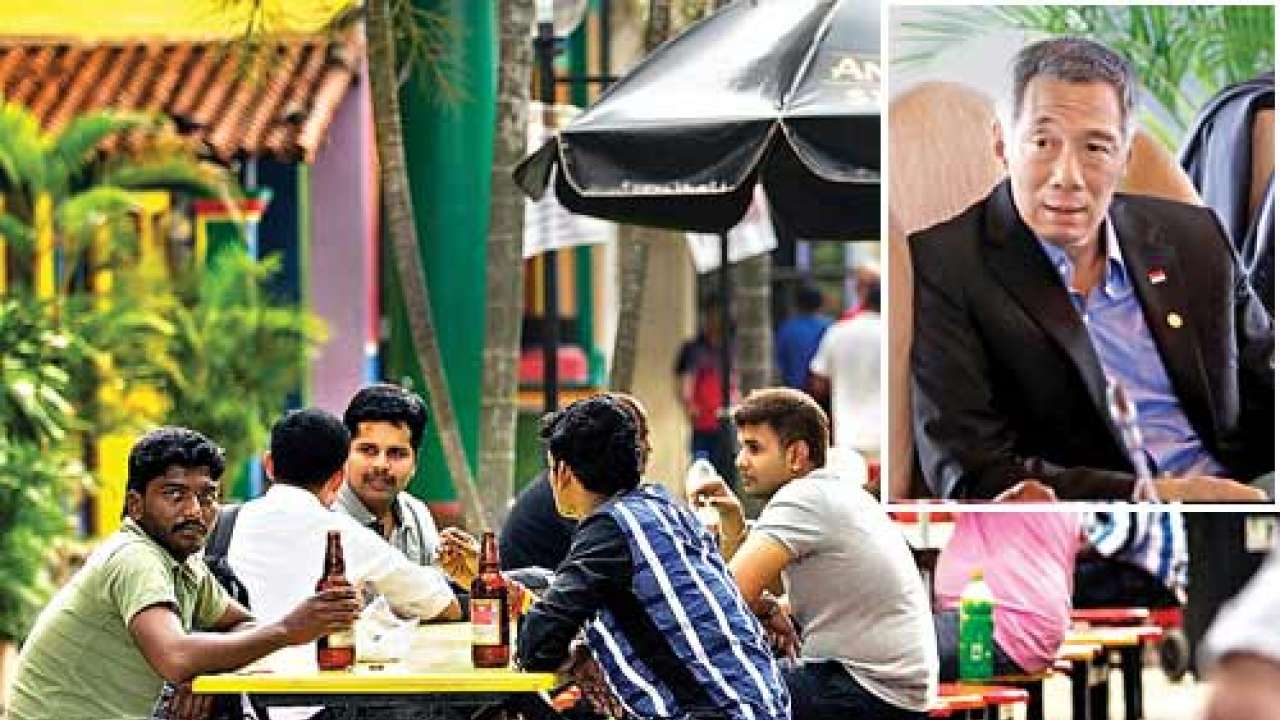
Sunday’s rioting by immigrant workers in Singapore’s Little India, following a fatal road accident that killed a fellow (Indian) worker, left scores of policemen and medical forces injured, and public property, including emergency rescue vehicles, damaged. For a generation or two that grew up in Chinese-led Singapore not knowing what a full-scale riot would be like, the first violence in 40 years came as a rude shock.
For, Singapore has zero tolerance for public protests, disorder and indiscipline. It believes in corporal punishments like whipping or caning. Chewing gum is an offence. It disallowed anti-globalisation protests against the World Bank-International Monetary Fund meetings in 2006.
Calling the Sunday riot “a very grave incident,” for which “there is no excuse”, Prime Minister Lee Hsien Loong, eldest son of Singapore’s legendary founder Lee Kuan Yew who brooked no dissent throughout his rule, said: “We’ll spare no effort to identify the culprits and deal with them with the full force of the law.” Top cop Ng Joo Hee’s said, “…fighting the police is not the Singapore way (echoes of ‘the American way’) and the police will spare no effort. First to identify, and then we will find and then we will arrest and then we will prosecute everyone who was involved …”
And so, police rounded up scores of suspects, mostly Indians. And 27 of them, in the age-group of 23-45, were remanded in custody on various charges, including “rioting with dangerous weapons”, punishable by up to seven years in prison as well as caning, while the Chinese bus-driver who caused the Indian worker’s death is out on bail. Furthermore, police interrogated as many as 4,000 Indian workers. Singapore takes pride in its history of resolutely bringing non-citizens who violate the local law to justice.
While it is no one’s case to condone Sunday’s violence, Singapore would do well not to treat the incident as an aberration, and not be dismissive about the larger sociological implications. It would be wrong to ignore the underlying simmering resentment and frustrations of Singapore’s imported labourers. It is Singapore’s worst-kept secret that most of the lowly jobs (housemaids, construction workers, garbage removal and sewer maintenance personnel, so on) are performed by non-Chinese immigrants from South/Southeast Asia. Stories of worker abuse, intimidation and exploitation are aplenty: employers lodge thousands of imported workers in poorly provided cubbyholes, subject them to long work hours and confiscate their passports during the contract tenures.
Singapore’s defence has been that at the end of the day, imported workers still earn more than what they would in their own countries; that they get to work with modern tools in secure conditions; that they receive many perks… all of which help them to support their families back home.
What is overlooked is that the cheap labour seldom get adequate time to socialise and enjoy a better life, one of their aspirations. Nor do they get proactive government protection from unethical employers. Sunday is their only day off, when they descend on Little India from far-off suburbs, to meet up, eat, drink, share sorrows and generally rail (privately — any other way would invite punitive action) against the local government for not doing enough to improve their lot.
It is a plight that global media can relate to — Singapore’s heavy-handed approach in dealing with media outlets that publish content critical of the local regime is well-documented. Perhaps, Black Sunday is a wake-up call. Singapore’s sovereign funds like the GIC and Temasek Holdings rake in billions through largely undisclosed corporate and financial market investments globally, including in India. It is perhaps fair to say that Singapore should share its wealth with not just its citizens but the imported cheap labour who help sustain “the Singapore way” of life and style — which is, by the way, marked by a fascination for anything Western. (For instance, the lane where the fatal accident took place on Sunday is called Hampshire Road. Nearby lanes are Gloucester Road, Oxford Road and Cambridge Road.)
Rather than undertaking a knee-jerk crackdown and trying to curb workers’ freedom — there is already growing anger against post-Sunday ban on immigrant workers enjoying a quiet weekend drink in and around Little India — Singapore would do well to address the underlying issues.
Else, it risks more violence, societal fissures and diplomatic fireworks. Already, sharp, polarised views mark online fora and media content. Native Chinese appear to suggest that immigrant Asian workers are disruptive and ungrateful, and should be taught a stern lesson. One prominent Singaporean intellectual of Indian extraction even suggested that imported labour get enviable freedoms (like unrestricted access to all areas), a contrast, he said, to Dubai where they have to live in ghettos, away from mainstream society. Influential Singaporeans are calling for a review of liberal issuance of employment passes to foreigners.
But others seem to imply that Black Sunday is a culmination of long-felt anger against the well-concealed racist and condescending demeanour of native Chinese towards immigrant non-Chinese races. PM Lee was quick to appeal that immigrant workers’ image must not be tarred but that their contribution in making Singapore strong be recognised. He must now consider a conciliatory approach in dealing with the fallout.
Perhaps, renaming Hampshire Road as Sakthivel Kumaravelu Road, after the victim of Sunday’s fatal accident, and ensuring suitable compensation for the victim’s family, could help cool tensions, and also herald a new chapter in Singapore’s relations with its underclass. Lastly, of late, India, Singapore’s key partner in trade and business ties, has not been taking lightly to any ill-treatment of its diaspora, particularly professionals and workers, across the world. Singapore can ill-afford to ignore this.
The writer is deputy news editor, ‘dna of money’